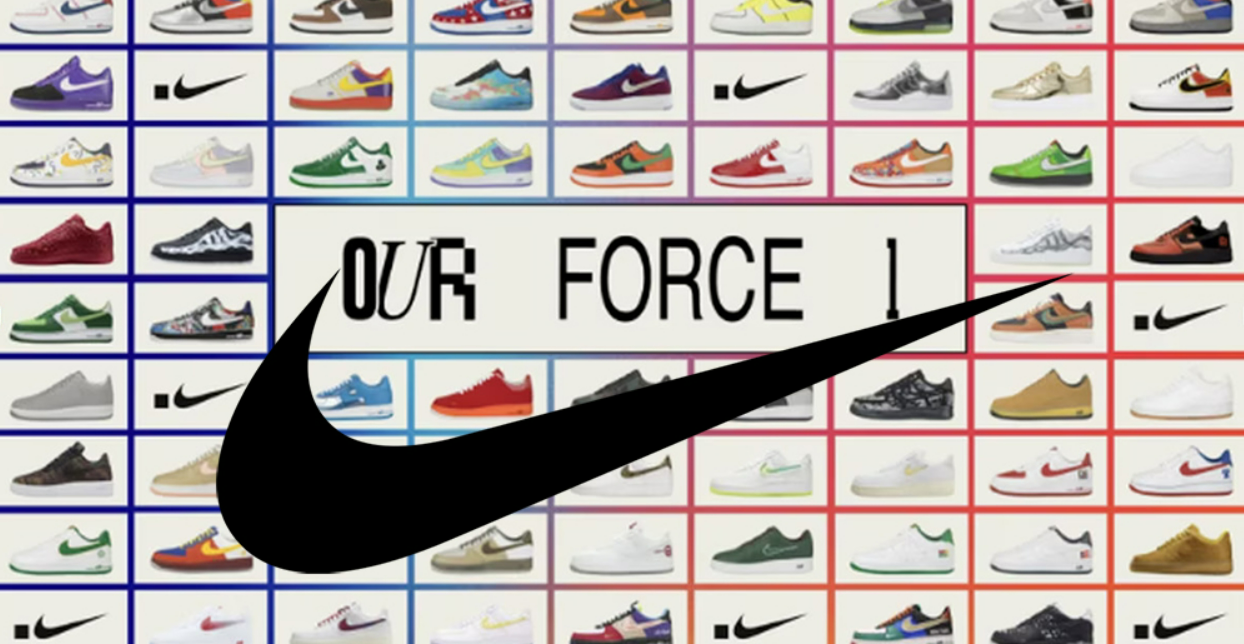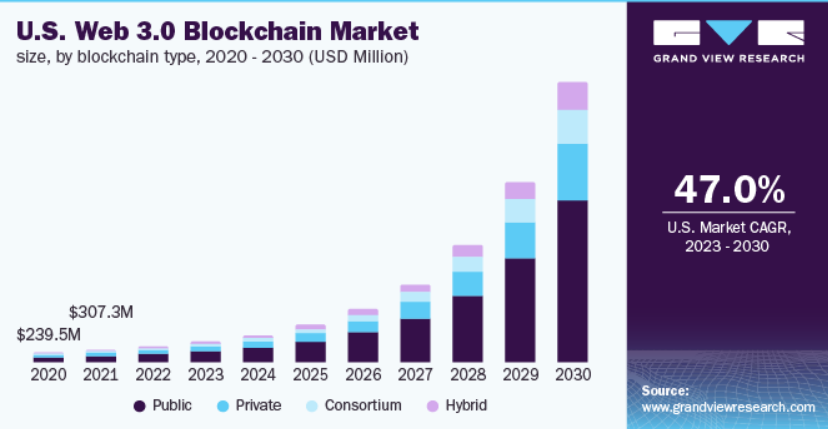
Web3, or the decentralized internet, has emerged as a powerful force transforming the marketing landscape. Unlike Web2, where users are mere spectators, Web3 empowers users to become active participants, redefining the principles of customer engagement and the dynamics of marketing.
Therefore, in the rapidly evolving Web3 space, traditional marketing strategies fall short. Businesses must adapt and develop innovative tactics to navigate the Web3 to engage and connect with the tech-savvy, forward-thinking audience.
10 Top Web3 Marketing Strategies
1. Community building in social media platforms
The decentralization of the blockchain and Web3 space is highly interconnected. To tap into a larger audience, businesses must build relationships within the community. Social media is an excellent place to foster such communities, where like-minded individuals can share ideas, experiences, and feedback. It also helps to build trust and genuine relationships with your customers, which is invaluable for creating loyalty. Appropriate social networks are:
- Telegram
- Discord
By sharing your roadmap and goals with the audience on different channels, you foster trust and demonstrate commitment to your project's longevity and its stakeholders. This strategy not only allows your community to have a clear understanding of your project's direction but also creates an opportunity for them to provide valuable feedback and feel truly part of your journey. Moreover, gathering valuable feedback from your community and comprehending their needs are crucial factors for enhancing user experience in the Web3 decentralization industry.
Brands can gain access to a larger pool of resources when they invest in building relationships with key members of the community and engaging them in creative collaborations. And that's only one of many crypto community management tips available out there. This trust and loyalty are invaluable when it comes to creating a strong brand identity and fostering long-term customer loyalty.
2. Influencer marketing
Influencers have become the superstars of the digital age, and the decentralized Web is no exception. A successful strategy should focus on finding the right mix of content creators who can effectively communicate brand messages across various social media communities.

Partnering with them who have a strong presence in the decentralization can significantly boost your visibility. Since influencers often have strong relationships with their followers, they are better able to foster an emotional connection that resonates with viewers and leads to higher engagement rates.
3. Tokenization
Tokenization is a key element of the Web3 landscape and offers businesses an untapped potential for generating significant ROI. It is a product or service that can unlock exciting opportunities for companies to access new markets, create loyalty among users, and generate revenue.
By creating utility tokens and DApps for your platform, you can incentivize user engagement, offer rewards, and foster a sense of ownership in your community. Users can earn and trade coins, creating a thriving ecosystem around your brand. This technology enables businesses to bridge the gap between traditional finance and the decentralization, allowing them to access a larger pool of investors and customers.
4. Content creation and NFTs
Non-fungible tokens (NFTs) have taken the digital art and collectibles world by storm. NFT allows businesses to create digital collectibles that can be bought, sold, or traded on the blockchain. By leveraging NFTs for content creation, brands can let their users engage with their products and services in new and exciting ways.
In addition to creating engaging NFTs, businesses must also focus on content creation to establish a strong presence online. Content can include educational materials such as blog posts, videos, podcasts, webinars, case studies, whitepapers, etc. This will not only help educate users about your brand but also help establish you as a thought leader in the decentralization space.

To craft an effective content marketing strategy, it is imperative to adhere to the following marketing tactics:
- Define your target audience clearly and create content that is relevant and valuable to them. Identifying your target audience allows you to tailor your message effectively and ensure its impact.
- Take the time to define what you aim to achieve and ensure that your goals align harmoniously with your broader business objectives.
- Develop a comprehensive content calendar. Strategically outline the content genres you aim to produce and the ideal publication schedule. By implementing a content calendar, you will enhance organization and maintain a consistent flow of valuable content creation and distribution.
- Utilize data to gain insights into the content that resonates best with your target audience, allowing you to tailor your approach accordingly.
5. PPC advertising
With Pay-per-click (PPC), businesses can target specific audiences with tailored messages and optimize results in real-time. It provides businesses with detailed insight into their customers' behavior which can be used to further refine their marketing campaigns. Targeting the right keywords and demographics can help you reach potential users and investors.
Since decentralization is still in its infancy, the industry lacks top-tier platforms for PPC campaigns. However, since the cryptocurrency space is highly regulated, businesses must ensure they are compliant with all laws and regulations before embarking on a PPC campaign.
6. Search Engine Optimization (SEO)
For Web3, keyword research is particularly significant since the industry is highly competitive. Your SEO strategy should focus on using the right mix of keywords and phrases to boost ranking and visibility. Optimizing web pages for mobile devices is also critical since most users today access websites through their smartphones.
SEO efforts aim to make a website more attractive to a search engine and improve its ranking. When properly executed, SEO (which sometimes branded on the market as crypto SEO) can help your Web3 business improve its online visibility, reach more customers, and achieve higher conversions and ROI.
7. AI-powered market tools
AI-powered marketing tools are an absolute game-changer for 2025. Businesses realize that human effort is no longer enough to keep up with the ever-growing demand for data. AI can help businesses process and analyze data more efficiently, thereby helping them make informed decisions based on real-time insights.
In the Web3 space, AI can be used to automate various processes such as customer segmentation, lead scoring, keyword optimization, and content curation. AI also helps in identifying new opportunities for growth while reducing the cost of marketing campaigns.
By using AI, you'll unleash a torrent of top-notch, relevant content in record time, turbocharging your efficiency to incredible levels. But, let me emphasize this: always scrutinize and fine-tune any output from AI systems to maintain the highest standards.
Though AI content generation is a formidable force, tread with caution. It cannot replicate the finesse and profundity of human-generated content, potentially introducing biases and lacking in writing finesse.
8. Metaverse marketing

The Metaverse is the virtual layer of reality, where users can create and customize their own digital identities. As Web3 technology continues to evolve, this technology offers an amazing opportunity for brands to engage with their customers in a truly immersive experience.
Businesses can leverage the power of avatar-based interactions to promote products and services more effectively. This can include virtual product demonstrations, interactive events and contests, immersive tours of a virtual world, and more. Virtual marketing is also an ideal way to reach out to the gaming community since it offers an engaging alternative to traditional advertising.
9. Loyalty programs
Loyalty programs have become an integral part of Web3 businesses, as users are looking for more tangible rewards instead of just discounts. This can include exclusive offers, free products, or services. By rewarding loyal customers with thoughtful incentives, businesses can use loyalty programs to reward customers for their purchases, referrals, and other activities related to the business.
The coins used in loyalty programs provide users with greater flexibility, as they can be stored, transferred, and exchanged across different platforms. This gives users more control over their digital assets and helps foster a better relationship between the user and the business. Loyalty programs also allow businesses to collect valuable data, allowing them to develop better customer profiles for improved market targeting.
10. Collaboration with other Web3 projects and decentralization startups
Collaboration with other projects could include partnerships, joint campaigns. Working together in the space can help businesses tap into new audiences and increase their network.
Collaborations also offer an opportunity for businesses to learn from each other and leverage the expertise of different decentralization projects. This can be beneficial to both parties, as they can learn new market tactics for driving user engagement. Furthermore, it also helps build goodwill in the Web3 space, promoting unity among businesses and fostering relationships with key players.
Staying ahead in the Web3 Marketing Trends Landscape
Web3 market technologies: growing popularity
As Web3 technologies continue to become more popular, the number of businesses using them grows. This means that competition will become fiercer and staying ahead in the game requires careful planning and execution.
- By 2026, McCann Worldgroup predicts that 2 billion people worldwide will be immersed in the meta-universe daily, engaging in various activities like work, shopping, education, socializing, and entertainment. Additionally, the market for virtual goods in the meta-universe is projected to reach an astounding $200 billion by that year.
- In the digital marketing revolution, the Global Web 3.0 blockchain market is a force to be reckoned with. It is projected to generate $23.3 billion in revenues by 2028.
- By 2030, the meta-universe market is projected to reach a staggering valuation of $678 billion, a remarkable growth from its 2021 value of $39 billion. This implies an impressive compound annual growth rate of around 39% over ten years, according to Grand View Research.

We will all witness unprecedented changes in the way billions of people interact, work, and thrive in the Web3 space as these staggering numbers indicate an unstoppable march towards a technological future.
Know the market trends
The Web3 space is constantly evolving, and businesses must stay on top of the latest trends and technological advancements to remain competitive. This could involve attending industry conferences and webinars, subscribing to relevant publications, or even consulting experts from other companies. Keeping up with the latest market technologies can help businesses identify growth opportunities and ensure that they don’t miss out on any potential advantages.
Organizations actively capitalizing on Web3 trends:
- Meta (Formerly Facebook)
- Nike
- Microsoft
- Nvidia
- Starbucks
- L’Oréal
- Adobe
- Electronic Arts
- LVMH
- Hyundai
- The NBA
- Samsung
As you can see, Web3 is being actively implemented in completely different business niches. The key to success is to not afraid to experiment with unconventional marketing strategies and embrace emerging technologies. By testing various approaches, businesses can gain valuable market insights into the effectiveness of their strategies and use this insight to refine their strategy over time. This can help them identify what works best for their audience, allowing them to stay ahead in the Web3 marketing landscape.
Keep in mind that market data is at the core of any successful Web3 business, and data-driven insights can help businesses gain a better understanding of their customers. Focusing on analytics helps businesses measure and monitor the success of their campaigns, enabling them to refine the strategy over time.
The Verdict
There are no shortcuts when it comes to success – businesses must stay informed about the latest market trends and technologies and invest in emerging technologies to remain competitive. The fluid nature of the Web3 marketer demands adaptability and a readiness to seize new opportunities.
With the right strategy and execution, businesses can make Web3 marketing work for them and uncover growth opportunities. Embrace the continual evolution of this sphere, and you'll be well-equipped to achieve significant growth and success in your Web3 venture. Need help? You can always rely on FINPR, Web3 PR and marketing agency, who helped to promote 250+ Web brands starting 2017.
FAQ
What is Web3 marketing?
Web3 marketing is a marketing approach that leverages Web3 technologies, such as blockchain, decentralized applications (dApps), and cryptocurrencies, to create innovative and decentralized marketing campaigns. It involves using these technologies to engage with and reward users in novel ways.
How does Web3 marketing differ from traditional marketing?
Web3 marketing differs from traditional marketing in several ways:
- Decentralization: Web3 marketing relies on decentralized networks and platforms, reducing the control of central authorities.
- Ownership: Users have greater ownership and control over their data and digital assets in Web3 marketing.
- Tokenization: Tokens and cryptocurrencies are often used to reward and incentivize user participation.
- Transparency: Blockchain technology ensures transparency and immutability of data.
- Community Engagement: Building and nurturing communities is a core element of Web3 marketing.
Community is crucial in Web3 marketing because decentralized platforms thrive on user participation and collaboration. A strong community can drive project development, increase brand loyalty, and provide valuable feedback.
Traditional marketing methods will likely continue to coexist with Web3 strategies. The degree to which Web3 marketing becomes dominant will depend on its adoption and evolution over time.
What are some examples of Web3 marketing strategies?
Web3 marketing strategies include:
- NFT Campaigns: Creating and selling unique NFTs (Non-Fungible Tokens) that serve as collectibles or access passes to exclusive content or events.
- DeFi Partnerships: Partnering with decentralized finance (DeFi) projects to offer crypto rewards, loans, or yield farming opportunities.
- DAO Engagement: Involving users in Decentralized Autonomous Organizations (DAOs) for decision-making and rewards.
- Blockchain-Based Loyalty Programs: Implementing loyalty programs on blockchain to offer users token rewards for engagement.
- Content on Blockchain: Publishing content on decentralized platforms, ensuring content authenticity and control.
Is Web3 marketing suitable for all businesses?
Web3 marketing may not be suitable for all businesses, as it depends on the target audience and industry. It is particularly relevant for businesses in tech, gaming, art, and entertainment, and those looking to engage with tech-savvy and crypto-interested audiences. However, it's essential to carefully evaluate whether Web3 aligns with your brand and customer base.
Traditional businesses can incorporate Web3 marketing strategies by accepting cryptocurrencies, engaging with customers on decentralized platforms, or using NFTs for brand promotion and customer loyalty programs.
Incorporating Web3 technologies into your marketing strategy can be a promising way to engage with a tech-savvy and crypto-interested audience. However, it's essential to approach it thoughtfully, stay informed about the evolving landscape, and adapt your strategies accordingly.
What are the risks associated with Web3 marketing?
Web3 marketing has its share of risks, including regulatory uncertainties, market volatility, and security vulnerabilities. It's essential to stay informed about legal and compliance issues and be cautious when handling cryptocurrencies and NFTs.
While Web3 marketing can offer greater data ownership to users, it's important to implement privacy-enhancing technologies and follow best practices for data protection. Utilize zero-knowledge proofs, secure encryption, and decentralized identity solutions to protect user privacy while still providing personalized experiences.
How can I measure the success of my Web3 marketing campaign?
Success can be measured through community growth, engagement levels, blockchain analytics (like NFT sales and transfers), cryptocurrency transaction volumes, and traditional metrics like web traffic and social media analytics.




